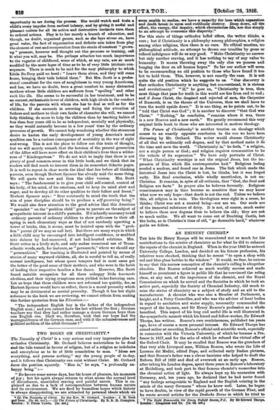TWO BOOKS ON CHRISTIANITY.*
'The Necessity of Christ' is a very serious and very impressive plea for orthodox Christianity. Mr. Orchard believes materialism to be dead and the tide turned in favour of religion, but of a religion so indefinite and amorphous as to be of little consolation to man. " Ideas are everything, and persons nothing," say the young people of to-day, and it follows that Christianity can exist without Christ. Mr. Orchard „faces the position squarely. " Man is," he says, " a profoundly un-
happy being "
He knows some serene days, has his hours of pleasure, his moments of joy ; but his spirit always 'returns to what seems the normal level of disturbance, unsatisfied craving and painful unrest. This is ex- plained as due to a lack of correspondence between human nature and its environment. We are fired by boundless hops which history eIs always disappointing, we are attracted by personal ideals whit* we '• 0) The Necessity of Christ. By the Rev. N. Orchard. London : M. -Bent Dad Bona. (2s. ed. uet.I--(2) The Future of ChriettanUy. By B. R. H. OromptOn. London : T. Maher ameba Ms. mate seem unable to vs/slime, we 'have=ity for lose which sapartgion
and death :break in -upon and ra destroy. Deep down, ell' the effort, the energy, the ixteruiry, reed& eitaracterize Me, tare due simple to an attempt to oeereome this disparity."
For this state of things 'orthodox belief offers, the 'writer thinks, it cure ; but if Christianity is a philosophy among philosophies, a religion among other religions, then there Is no cure. No 'ethical maxims, tto philosophical attitude, no attempt 'to drown our troubles by gross or refined indulgence will do us any good. " Make Christianity no answer but only another craving, and it has nothing to -say 'of any value 'to humanity. It means throwing away the only clue we possess and banging the door on all human hopes." So Ur our author evral -seem 'to be recommending an old position to those who have found it tole hot to hold them. 'This, however, is not exactly the ease. It in 'net quite the old position which he suggests to us. "Our discovery is 'that orthodox Christianity in anything but conventional, It is riotous and revolutionary."' '" If," he goes on, " Chrietierrity is true, then most things that pass for truth in this world are lies from end to end; and if Jesus Christ, the despised and rejected of men, the Carpenter of Nazareth, is on the throne of the Universe, then we shall have to turn the world upside down." It is one thing, es he points out, to bo
told that Christ was God"; it is another to discover '"that God was Christ." "Nothing," he concludes, "remains where it was, there is a new Heaven and a new earth." We greatly recommend this very original little book to those who are interested in modern theology.
The Future of Chrietianity2 is another treatise on theology •which comes to an exactly opposite conclusion to the one we have been discussing by Mr. Orchard. The water would cleanse Christianity of all that we ordinarily call dogma, and by that method make it fit the time and save the world. " Christianity is," he feels, " a religion, not a single person or God ; and religion requires communities to be the vehicle of its expression." We have only portraits of Christ. " What Christianity worships is not the original Jesus, but the im- pression of Him which His contemporaries had." Religious feeling needed a nucleus, and found one in &GM. The link which made the historical Jesus into the Christ is lost, lie thinks, but it was forged early. His final conclusion, while wholly unorthodox, is not un- Christian. It remains, in spite of all criticism, •that "God, the Soul and Religion are facts." In prayer also he believes fervently. Religious consciousness may in time become so sensitive that we may know what now we only hope—that death is not the end. Unless we believe this, all religion is in vain. The theologians were right in a sense, ho thinks; Christ was not a created being—nor are we. Our souls are of the immortal substance of deity. It is not, of course, much easier to believe these new dogmas than to believe the old ; they are not so much unlike. We all want to oome out of Doubting Castle, but the locks, as in Christian's time of old, " go damnable hard," whatever guide wo follow.


































 Previous page
Previous page